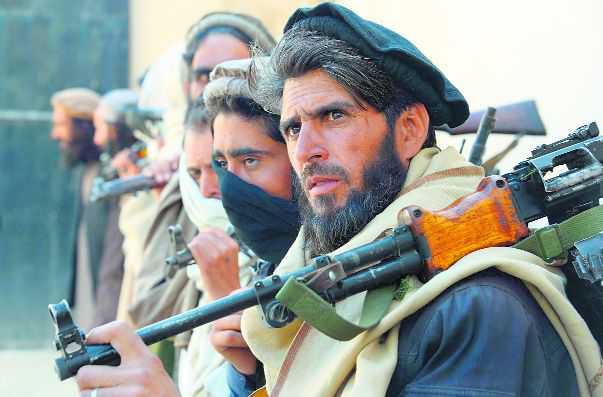
Peace fighters: The Taliban-government talks are a must for a meaningful pact.
Vappala Balachandran
ex-Special Secretary, Cabinet Secretariat
It was perhaps a coincidence that eight secret documents, five of them in Russian, on the origins of the 40-year Afghan war were released by George Washington University on the very day (January 28) when Zalmay Khalilzad, US Special Representative for Afghan Reconciliation, was advising Afghans that the ‘key to peace lies with Kabul’. In many ways, these releases underscored the hollowness of big power advice to the hapless Afghans whose fate is decided by foreign powers while they continue to suffer.
These documents show that the Soviet Union, which was earlier reluctant to extend military assistance to restore civil order, as requested by President Nur Muhammad Taraki after the 1978 Saur Revolution, had hastened to intervene when President Hafizullah Amin summoned US diplomat Archer Blood on October 27, 1979. By then, the Khalq-Parcham fights in Afghanistan had worsened, threatening ‘the results of the Saur Revolution’ and Amin had overthrown Taraki and killed him. Ironically, the transcripts of the 40-minute Amin-Blood meeting now released did not contain any conspiracy against Soviet Union. Blood had stated: ‘Except for a strong interest in US development assistance, I did not succeed in soliciting from President Amin any specific suggestions… in the interest of improving our bilateral relationship’.
Yet KGB chief Yuri Andropov misread the meeting and wrote a handwritten memo early in December 1979 to Leonid Brezhnev, suggesting intervention. He quoted the requests made by Afghan leaders like Babrak Karmal and Sarwari and suggested using two battalions stationed in Kabul. Initially, no outside troops were called in. As a result, Operation Storm 333 was mounted on December 27, 1979, resulting in Amin’s killing and installing of Babrak Karmal.
There was overreaction or ‘course correction’, too, in Washington DC. US national security adviser Zbigniew Breziznski’s redacted secret note to President Carter on December 26, 1979, is reproduced here. Earlier, the US military aid policy had neglected Afghanistan. One reason was its remoteness and another was that ‘Afghanistan would be like Mexico for us’. Breziznski wanted this to be changed by extending help to the rebels: ‘more money as well as shipments and some technical advice. We should encourage the Chinese to help the rebels also’.
The thrust of the note was protecting Pakistan from turmoil: ‘Pakistan is both unstable internally and extremely apprehensive externally... unless we somehow manage to project both confidence and power into the region....’ The editors have added: ‘The blacked-out portions when this document was declassified in 1993 all refer to Pakistan’ and that the missing portion was connected to its quest for nuclear bomb ‘meaning that Pakistan’s nuclear bomb program now would have a get-out-of-jail-free card’.
Has the regional situation altered since, although the key players might have changed? In place of the unreliable and often feuding Mujahideen we now have the battle-hardened Taliban. Afghan President Ashraf Ghani had said at the World Economic Forum, Davos (January 25), that the Taliban had killed 28,000 security personnel since he became the leader in 2014. During the same period, they killed only ‘less than 72... it shows who is doing the fighting’. Several Afghan leaders have questioned Khalilzad’s assertion that only Kabul can bring in peace. Amrullah Saleh, a former National Directorate of Security (NDS) chief, said: ‘The key for peace is in Kabul’ was a shallow evaluation of the peace process’, adding ‘the determination and will for peace has always been in Kabul but the key to peace has always been held hostage in GHQ/Rawalpindi... a package to re-victimise a victimised nation and condemn it to humiliation is not practical or sustainable’.
Others have pointed out that the Taliban did not recognise the present government. How then could Kabul talk to them? Rahmatullah Nabil, former NDS chief, said he had opposed the signing of an agreement between National Unity government leaders and Pakistan’s ISI when he was leading the NDS, as it contained a provision that the Afghan government would prevent and counter any activities of separatist Baluchis and TTP from its territory. He asked: ‘Is the US and Unity government accepting ISI talking points on Afghanistan, and confirming that it is Afghanistan that is destabilising Pakistan? This shows who is surrendering.’
James Dobbins, former US special envoy during the Obama regime, who had talked to the Taliban ‘intermittently’ since 2010, has warned of ‘a number of chasms’. He framed three questions to assess Khalilzad’s success: Is the Taliban willing to talk to the Afghan government and stop fighting while they do it? Will the negotiations succeed in reaching an agreement on new arrangements for governing Afghanistan? Will that agreement be implemented? He did not think that US troops would be able to leave till then. His conclusions are ominous: ‘We kept insisting that the Taliban needed to also talk to the Afghan government... If they continue to refuse to do so, this agreement won’t mean anything either.’
Our media said India was represented at Khalilzad’s briefing for foreign diplomats by our deputy chief of mission in Kabul. It is true that the Army Chief, Gen Bipin Rawat, had suggested that we should talk to Taliban ‘if they were ready for lasting peace in Afghanistan’. Yet, he was not prepared to extend that idea to Kashmir. We should also not worry about President Trump’s remarks on our PM about the library that India had built which ‘was like five hours that we spend in Afghanistan’. The reality is that we have presently no capability in shaping the strategic developments of Afghanistan.



























